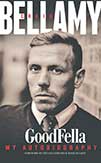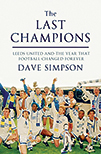 My autobiography
My autobiography
by Craig Bellamy
Sport Media, £18.99
Reviewed by Rob Hughes
From WSC 320 October 2013
As his old boss Mark Hughes points out in the foreword to GoodFella, Craig Bellamy has a lot of strengths but diplomacy isn’t one of them. It’s an approach that’s landed him in all shades of bother throughout a nomadic career, from the “nutter with a putter” spat with John Arne Riise to brawling with bouncers outside nightclubs. It’s all laid bare here, though the real selling point of this highly engrossing memoir (written with the Daily Mirror‘s Oliver Holt as guide) is Bellamy’s frank and often painful honesty. Especially when it comes to himself.
It’s unflattering stuff. Here is a man utterly consumed by football, driven by insecurity and a will to succeed that frequently veers into self-admonishment. Such intensity, he says, turned him into “the human snarl”. Dogged by repeated knee injuries, he’s sulky and uncommunicative, especially with his wife and kids. He admits to infidelities. And during his final days at Newcastle he becomes obnoxious and arrogant.
The watershed moment comes in November 2011, with the suicide of his idol and close friend Gary Speed. Cue a rigorous stock-take of his life and destructive personality, followed by therapy with British Olympic psychiatrist Steve Peters. Bellamy finally allows himself to let go of his rage. By then it’s too late to save his marriage but what emerges is a more forgiving, open and ultimately contented character.
Not that Bellamy was ever a footballing pariah – there are plenty of former team-mates who vouch for him both as a human being and professional – but GoodFella doesn’t hold back when it comes to those he disliked. Graham Poll comes across as a self-serving “celebrity ref”, starstruck by David Beckham and Patrick Vieira. And while Bellamy cites Bobby Robson as the best manager he ever worked with, his successor Graeme Souness is the iron fist who came in looking for a fight.
Both Rafa Benítez and Roberto Mancini are portrayed as joyless control freaks, the former an “unsmiling headmaster” with no room for spontaneity or sentiment, an attention-seeking dictator. City’s Brazilian folly Robinho is appallingly lazy, both in training and on the pitch, and a spoilt man-child when Bellamy confronts him about it.
Perhaps the most damning verdict is reserved for one-time Newcastle strike partner Alan Shearer, who is seen as a self-absorbed egotist with a yellow streak. Bellamy gleefully recounts the England man’s reluctance to leave the pitch after a game against Manchester United, knowing that Roy Keane (who’d been sent off for a Shearer-related fracas) was waiting in the tunnel. And after hearing he’d supposedly dissed him to others after moving on to Celtic, Bellamy texts Shearer directly after Newcastle’s lame FA Cup semi-final defeat in 2005: “Fucking typical of you. Looking at everyone else yet again. You need to look at yourself instead.” Shearer threatens to knock him out next time he’s in Newcastle.
All of this serves as a thoroughly refreshing antidote to the usual blandness that makes for football biographies. But GoodFella is far more substantial than just a series of delicious anecdotes. It feels like a rich confession from one of the game’s most misconstrued personalities.
 Leeds United and the year that football changed forever
Leeds United and the year that football changed forever

